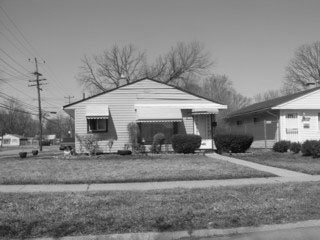“My mother told me if your hands are always folded up, you’ll never get any blessings. But if you put your hands out to help somebody, those are your blessings,” said Gwen, who originally purchased her home 15 miles outside of Detroit in 1967 when she was 21-years-old. Gwen and her husband are not wealthy, they are not living above their means and they did not take out a massive debt on a luxury home. “We’re just trying to make it,” she said.

Gwen and her husband’s home
Three years ago, Gwen’s husband was diagnosed with two forms of cancer and could no longer work his job at a tomato factory. In 1976, Gwen joined the military and her mother took over her property. Gwen eventually served in the Gulf War where she suffered a knee injury and was forced to go on disability. “I worked for a little bit and tried to maintain a job, but I can hardly walk.”
After Gwen’s deployment, her mother placed the name of her property under the names of
her two sisters. In 2002, Gwen’s mother passed away and after living all over the US and in Germany for five years, Gwen moved back into the home with her husband. The couple took out a loan on the house, but hindsight proved that they were not given a fair deal. “I would not recommend that lender to anybody because they were fine-printing stuff,” said Gwen. “They lie. You have to have a magnifying glass with them.”
The couple relied on Gwen’s disability checks and her husband’s income from the tomato factory to support themselves, but when he got sick and could no longer work, they could no longer make their mortgage payments. Gwen has seen the devastation caused by the foreclosure crisis in her own community and feared the home that has been in her family for 47 years might become another casualty to be preyed upon by vultures.
“There are so many homes in this neighborhood that are empty and there are people going in to take out the plumbing, the furnace, the water heater,” Gwen said. “When you buy a house here, it’s just like a shell. You don’t have anything, cabinets or nothing.”
AHP eventually purchased the mortgage to Gwen and her husband’s home, but due to their inability to catch up on delinquent payments, AHP was forced to foreclose on the property. This was not the end of the line, however, and AHP was able to keep its social mission at the forefront of the relationship with Gwen and her husband. Though the property was no longer in their name, AHP was able to work out a lease option arrangement which allowed the couple to pay rent, stay in their home, and eventually regain ownership.
As a part of their lease and option agreement with AHP, Gwen and her husband will now make monthly payments of $248. If they can manage these payments in addition to catching up on delinquent taxes and insurance payments, the couple will once again own this long-time family property. Gwen was very thankful that AHP was able to help them keep their home and spoke highly of her experience working with Senior Asset Manager Jake Laffey.
“With your help, we are still in this home, and I thank you and appreciate it,” Gwen said. “You all have been so profoundly professional, especially Mr. Laffey.”
Gwen says her husband’s doctor expects him to be fine and that he will survive. Her husband has spent the last three years fighting to get his disability claim settled, however, and Gwen feels that the company may just be waiting for him to die so they will not have to deal with it. Though they still have their home, the couple struggles financially and has to scrape by just to eat on some occasions.
“I know how to survive,” Gwen said. “I’m trying to have a little garden on the side with some greens and stuff. And then I try to help some of the older neighbors down around the block. I have so many greens, I go and give them some.”

 440 S LaSalle Street, Suite 1110, Chicago,IL 60605
440 S LaSalle Street, Suite 1110, Chicago,IL 60605




